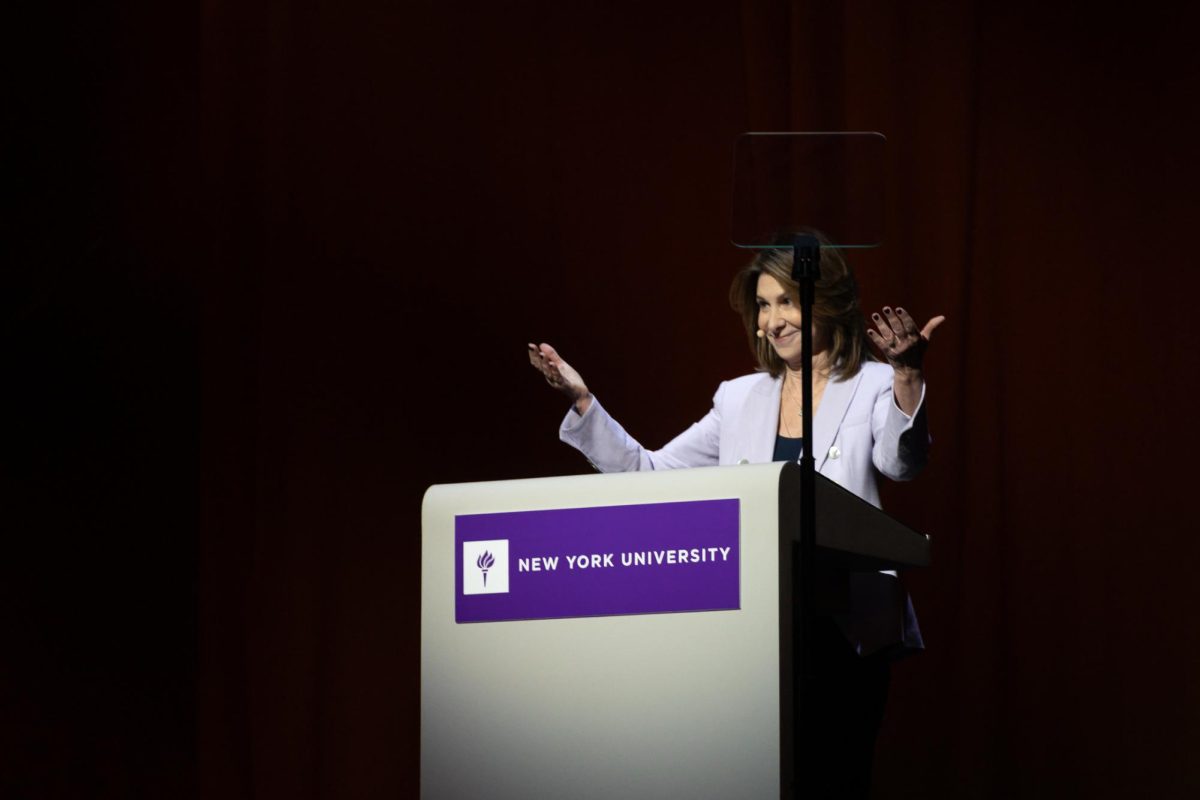Tisch blacklist prompts administration to address student misconduct
After an anonymous list accusing film students of misconduct circulated in the Tisch School of the Arts in early March, some students raised their concerns to the administration about sexual harrassment in the school.
The lobby of NYU’s Tisch School of the Arts. (Photo by Gabe Vasconcellos)
May 3, 2022
Hopeless about the lack of accountability for students in the department of Undergraduate Film & Television at the Tisch School of the Arts, a student in the program created a list for their peers to anonymously report student misconduct in the department.
The list — a Google spreadsheet for women and gender non-conforming people to share negative experiences with men on and off set — has been shared around NYU through a QR code in the 11th floor women’s bathroom of the main Tisch building. It was made private in April due to claims that some of the reports were false.
“I was really trying to think about how to hold these people accountable, because clearly, there was no way they are being held accountable now besides just word of mouth,” said the student who made the list, who asked to remain anonymous due to fear of retribution. “It all went downhill so quickly, and people started getting really serious. I started to really realize how big it had gotten.”
Tisch dean Allyson Green, associate dean of student affairs Anita Gupta and Film & Television chair Ezra Sacks addressed the list in an April 11 email to NYU film students. The email said the anonymity of the list limits the actions that the department can take towards the incidents of misconduct and encouraged students to use NYU resources to handle their reports.
“For its part, NYU is committed to promoting an environment where all members of our community are safe, and to addressing issues of sexual misconduct, harassment, and other forms of misconduct,” the email reads. “To that end, we have long maintained policies and procedures that are designed to address instances of misconduct with fairness; that rely on thorough investigation; that provide resources and support to the parties involved; and that seek an impartial outcome.”
The student who created the list criticized the administration’s response and said that the email did not respond to the Film & Television department’s toxic environment or take action to protect students on set.
“They had a great opportunity to actually address it and say that they’re going to start holding students accountable, but they didn’t do that at all,” they said. “Tisch could a little more intuitively realize that this list is not to slander men or directly affect men, the sole purpose of it is to protect women and protect minorities on set.”
Tisch junior Veda Keda had heard about the list and said they had previously learned of many of the reports through word of mouth. Though they think the list can help protect other students if the reports are truthful and of serious misconduct, Keda said that it allowed students to make less serious reports out of malice.
“It was a way for people to get back at people that they disliked,” Keda said. “One guy was on the list because he wore a Pornhub shirt to class, and that’s a little too much.”
Keda had previously had issues with the department’s handling of their concerns regarding a professor’s behavior. They said that one of their professors repeatedly misgendered a character in their screenplay and asked them to remove their mask while alone in an elevator to see their face.
Following the incidents, Keda contacted NYU’s Bias Response Line, but they said the school did not take official action. Once Keda raised their concerns to Sacks, the department chair spoke to the professor about their behavior.
Keda also was sexually harassed by another student in the Film & Television department, but said they did not feel comfortable using NYU resources to report the incident. They worried that they would not be taken seriously by the university. They also said that the Film & Television curriculum fails to teach students about safety regarding other students on set.
“You have to take this class called set safety, and it helps you keep yourself safe,” Keda said. “However, the class is pretty much useless when it comes to safety from other people. A lot of film students now want to do intimate scenes, and that’s fine, but you’re not teaching students the right or the proper way to keep everyone on set safe.”
Keda and another Tisch student met with the school administrators on April 27 to address student safety in the Film & Television department after they raised concerns about student misconduct. At the meeting, they discussed introducing a new departmental safety course, as well as making revisions to the existing safety course.
After the meeting, Keda and the other students started to independently conduct a survey to collect input from Tisch students about misconduct in the school. Keda emphasized that the school still needs to increase student safety and accountability outside of classes.
“We’re primarily focusing on sets as of right now, just because that is the one thing that the Film & Television department can control,” Keda said. “In terms of these sexual assault allegations, or rape allegations, and anything like that, it’s unfortunately not a department issue — it’s more of a public safety issue.”
The student who created the blacklist said that they plan to republish it once they figure out ways to prevent false reports, such as screening submissions before posting them. They said that they received emails from a friend of a blacklisted student threatening to approach NYU Campus Safety and the New York City Police Department unless they publish a list of what the friend perceives to be false accusations.
“The whole point of it is to not just hold people accountable or to call out bad behavior, but it’s to protect the community,” the creator said. “Especially in Film & Television, it’s a very collaborative space and Tisch is very keen on that collaborative space. I don’t think they understand that by being in a collaborative space and not disclosing what certain people are capable of, such as sexual assault and rape, it will just keep happening.”
Contact Carmo Moniz at [email protected].




























































































































































